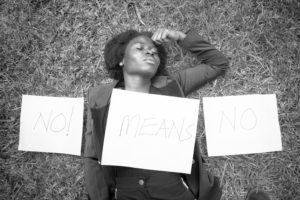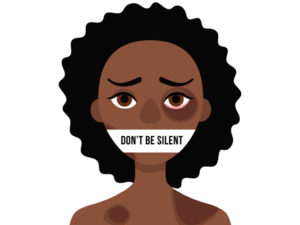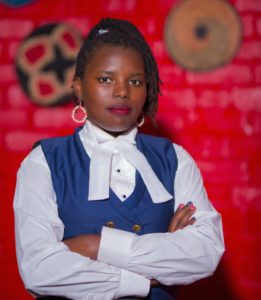Sunday morning November 22, 2020, I am lying in bed scrolling through my phone because it is a lazy day. I receive a text from my friend sharing a link to a story on sexual violence. It is a long story starting from the survivor’s childhood at age eight by her uncle to as recent as June 2019 when her boss raped her, the day before she started a new job. By the end of the story, I am lying in my bed sobbing at the horror of all of it. This is not the first story I am reading or hearing about, but especially this year. I have been on the receiving end of a lot of them.
My feminist work led me to be a responder on sexual violence cases. In January when young Ugandan women shared their experiences of violence on Twitter, I was at the forefront of reaching out to them, and with the support from my job, convening a healing space for them to unburden and access therapy. I remember walking away while someone shared their story to go behind the building to have a good cry as the weight of all that had been happening, and putting the space together had finally taken its toll on me. But I could not cry for too long, I had to get back and make sure everything was going well.
Prior to convening that space, a WhatsApp working group with my colleagues from work, a few lawyers, activists and therapists was created but was never disbanded as it has now become the place where we vent, seek help for survivors and ask for contacts within our network every time a story comes to our attention.

Then entered the Covid19 induced lockdown where sexual violence was thriving and help almost impossible to extend. I remember every person who contacted me. I remember the woman who was gang-raped. She needed medical assistance but had no means of leaving her home in Mpigi district due to the restrictions on public transport. She could not sleep and neither did she have money for food. We had to raise money for her to get some food and medicine. I had to contact Action Aid in the middle of the night to ask them to pick her up to receive the medication she needed but also provide shelter because she did not feel safe in her home.
I remember the girl who sent me 54 screenshots of a message exchange from her boss who after raping her had threatened to throw her in jail if she dared to report. He followed through on the threat, and for months she was in imprison on some bullshit cyber harassment charges
I remember finding the names and contacts of every domestic violence shelter, legal aid personnel and therapist and constantly making referrals to them.
I remember the feelings of helplessness when we were unable to help with the urgency the cases required either because of the restrictions on movement or simply because it was unaffordable.
I remember the frustration and sleeplessness as I tried to follow up every story and sometimes could not get to the survivors because their phone numbers were unavailable.
I remember every voice on the other side of the line, sometimes just needing to share their experiences with someone and cry.
I remember the therapist we could afford being so overwhelmed she had to stop taking on new cases furthering my feelings of helplessness.
The stories went with me to bed as I hardly slept, planning how to help the next person. Luckily during the lockdown, there was no need to dress up and show up at work.

I did not realize what a toll on my mental health it had taken until I stopped caring about pretty much anything. From simple things like not laying my bed when I woke up, to checking in on how my friends were doing(if you know me, I am the overly present friend), to failing to eat ( I would go full days without eating anything but water (again if you know me, my relationship with food is the most healthy relationship in my life), to being unable to read ( I have not completed a single book this year, every book I started has a bookmark halfway through if it is lucky or somewhere in the first 50 pages), to having anxiety to crying myself to sleep and dismissing comments about swollen eyes from colleagues in Zoom meetings that required videos on to failing to write.
I lost interest in other aspects of my work and I became desensitized to not just the stories of violence but also all the other social justice issues happening around. I was auto-piloting through life. I had a method. Do enough to seem present at work, show up on Zoom meetings with the same energy and just get through it.
I did not go to therapy despite the offer from my workplace because I was not ready. I was afraid of what that would unearth and I am still afraid. Maybe I will go next year. I have found other ways to cope like reminding myself not to center myself in every story which works great, talking about this with my friends with whom we carry the burden of this work and finally deciding to take a break from working directly with survivors because I realized I have nothing left to give.
I wrote this between tears and sobs to process my vicarious trauma. As we go on with the global #16DaysOfActivism against violence against women and girls, the stories will be many and triggering. This is our reminder to take it all in stride. One of my feminist sisters once told me that I need to pace myself because one day I will realize that all the energy I have is finite. I have learned my lesson- the hard way.
 Komusana Fionah is a feminist lawyer and blogger. She is a 2018 Tuwezeshe Akina Dada fellow under Akina Mama wa Afrika’s African Women’s Leadership Institute. Find her on Twitter @komusana
Komusana Fionah is a feminist lawyer and blogger. She is a 2018 Tuwezeshe Akina Dada fellow under Akina Mama wa Afrika’s African Women’s Leadership Institute. Find her on Twitter @komusana
